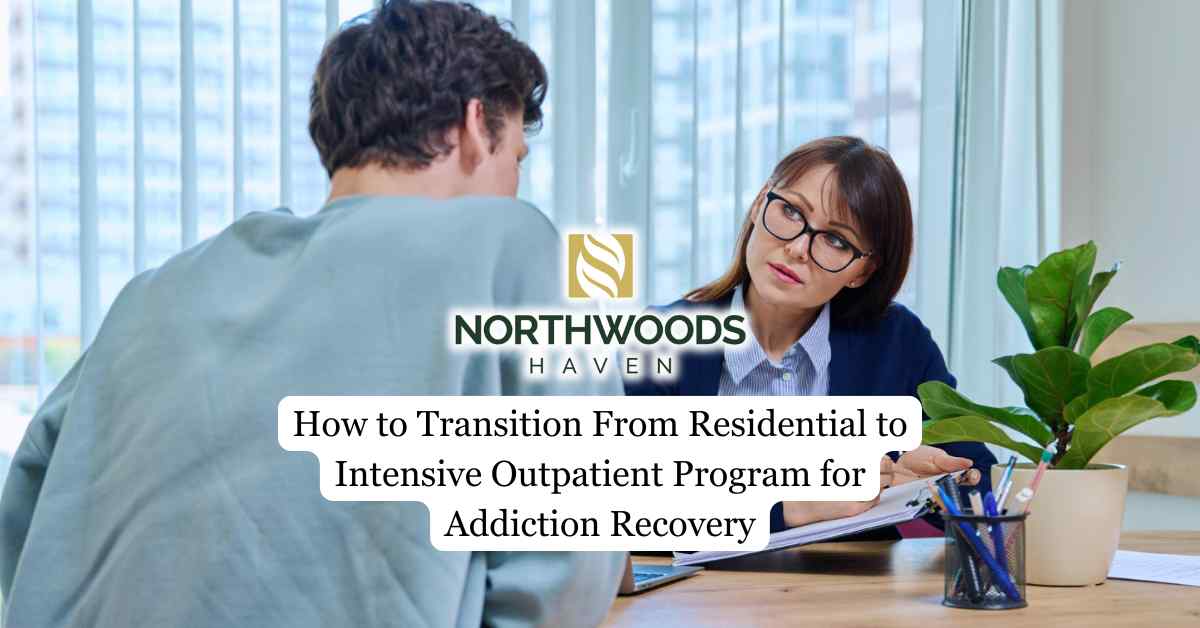The transition from a Residential Treatment Program to an Intensive Outpatient Program (IOP) for addiction recovery represents a significant change. This shift moves individuals from a highly structured and immersive environment to a more flexible setting. In this new phase, individuals can start to reintegrate into their daily lives while still receiving essential support. Understanding how to navigate this transition is crucial for maintaining the progress achieved during residential treatment and ensuring long-term success in recovery.
This article aims to provide a comprehensive guide on effectively managing this transition, highlighting the benefits, potential challenges, and practical steps to facilitate a smooth and successful shift from residential care to an IOP.
Understanding the Programs
Navigating the journey from residential treatment to an Intensive Outpatient Program (IOP) requires a clear understanding of the programs involved. IOPs provide structured therapy while allowing you to maintain daily responsibilities, making it an ideal choice for those transitioning from residential treatment.
You’ll typically attend 9-12 hours of therapy per week over several weeks, striking a balance between intensive support and personal flexibility.
In IOP, you’ll engage in group therapy sessions, individual counseling, and psychoeducational skills groups to develop coping strategies and strengthen your support system. These programs employ evidence-based therapies to address various conditions, such as substance use disorders, ensuring comprehensive care during your recovery process.
Before transitioning to IOP, you’ll undergo assessments to determine your suitability, focusing on your individual needs, commitment level, and the presence of a supportive living environment.
If you want to receive high quality assistance on your journey to recovery, then you should consider our IOP for Addiction Treatment in Minnepolis, MN. At Northwoods Haven Recovery we strive to provide proper care in our luxury rehab facility.
Preparation during Residential Treatment
During your time in residential treatment, actively engage in therapy sessions and put coping strategies into practice. This preparation will help you navigate the challenges ahead.
Establishing a strong support system is crucial for ongoing encouragement. Connect with peers and professionals who can provide guidance and understanding.
Work with your treatment team to create a personalized aftercare plan that outlines your goals and expectations for the IOP, ensuring a seamless transition.
Focus on developing life skills, such as stress management and effective communication. These tools will facilitate a smoother adjustment to the increased responsibilities you’ll face in the IOP.
Participate in educational sessions about the program’s structure, including group therapy and individual counseling. By setting realistic expectations and understanding what lies ahead, you’ll be better prepared to embrace the next phase of your recovery journey.
Read a more detailed guide about How to Prepare for an Intensive Outpatient Treatment?
Selecting the Right IOP
As you explore your options, prioritize programs that offer customized treatment plans tailored to your unique needs and circumstances. This personalized approach will help you address specific challenges and build upon the progress you’ve made during residential care.
Look for IOPs with flexible scheduling options, including both in-person and virtual sessions, allowing you to balance treatment with work or school commitments. Ensure the program incorporates evidence-based therapies like Cognitive Behavioral Therapy (CBT) and Dialectical Behavior Therapy (DBT), which have proven effective in managing addiction and co-occurring mental health disorders.
Consider IOPs that include family therapy or multifamily group sessions, as engaging your support system can enhance recovery outcomes and foster healing relationships.
Don’t forget to evaluate the availability of additional services, such as ongoing recovery coaching or aftercare programs, which can be vital for maintaining long-term sobriety post-treatment.
Being aware of What to Look for In an Intensive Outpatient Program for Addiction Treatment will help you make an informed choice during the selection process.

Building a Support Network
Engage your family members in the recovery process through family therapy sessions, which can enhance their understanding of addiction and equip them with tools to support you effectively.
Peer support is another crucial component of your support network; attending groups like AA or SMART Recovery connects you with individuals who share similar experiences, fostering a sense of belonging and providing encouragement during challenging times.
Establishing connections with mental health professionals, such as therapists and counselors, ensures you have ongoing support and guidance throughout the transition period. They can help you navigate obstacles and maintain your progress.
Take advantage of resources provided by your IOP, including aftercare support and recovery coaching. These services offer continued assistance and accountability as you adjust to life outside of residential treatment.
Challenges in Transitioning
You may struggle to maintain motivation and accountability without the constant support and supervision provided in residential care. This shift can increase the risk of relapse if not managed carefully.
Balancing daily responsibilities, like work or school, with the demands of attending IOP several days a week for multiple hours at a time can be difficult.
You’ll also need to make emotional adjustments as you reintegrate into your home environment after intensive treatment, which may cause heightened anxiety or stress.
It’s crucial to establish a strong support system during this transition, maintaining ongoing communication with therapists and support groups while adapting to a less supervised approach.
Remember that your treatment team is there to guide you through these challenges and help you develop the skills necessary for a successful transition to IOP and long-term recovery.
Benefits of Transitioning to IOP
IOPs offer a structured form of substance abuse treatment while providing flexibility for clients to maintain daily responsibilities like work or school. This enables you to integrate recovery into your everyday life, fostering a sense of normalcy and stability during the transition phase.
Furthermore, many intensive outpatient programs incorporate family programming, which helps heal relationships and enhance support systems crucial for sustained recovery.
IOPs also effectively address various mental health issues, such as PTSD and anxiety, alongside substance use disorders. This comprehensive approach makes them an excellent option for those stepping down from residential treatment.
Final thoughts from Northwoods Haven Recovery
At Northwoods Haven Recovery we’re prepared to guide our patients through transitioning from residential treatment to an IOP. We establish personalized aftercare plans, which typically include ongoing therapy, support group attendance, and a strong sober support network. During our IOP for addiction treatment patients will benefit greatly not only from our staff of addiction professionals but also from the luxury facilities and the supportive environment in our rehab.



